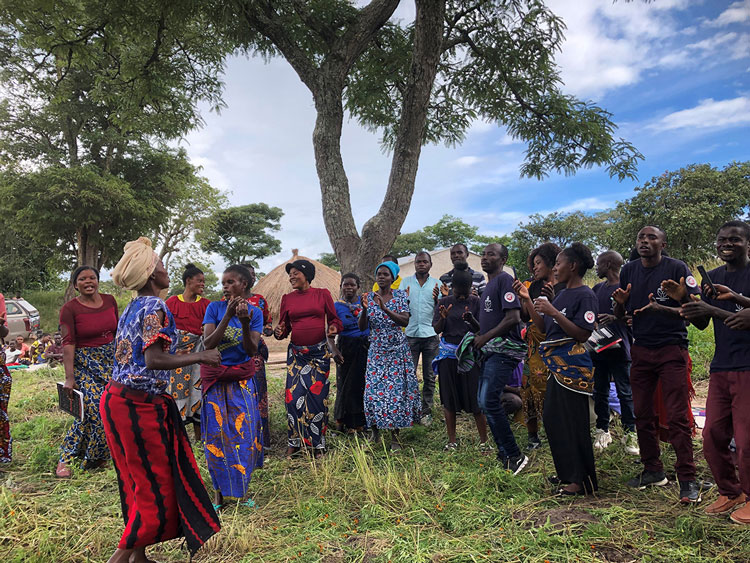Zambian villagers share hopes and challenges for their Gender Equality Project
Zambian Gender Equality Project Update June 2023
“Our village was well-known for child marriages. But since the project has begun, we have been able to address some of the issues about this. Is it healthy for a girl of 10 to marry and get pregnant? Some have even died. The Gender Action Groups have been able to talk to families about these issues. We headmen are trying to cancel these traditional marriages. But we are often challenged by parents when we intervene. They say, ‘You are not this girl’s parent!’ Then we have the problem of polygamy, with some men having more than one wife at a time. This also contributes to gender-based violence in the community.”
These words were spoken by Clement, a village headman, during a recent visit in March of 2023 by AID’s African Programs Manager, Dr. Julianne Stewart, to Bunda Chunsu and Kaoma Makasa in the Diocese of Luapula as the two project sites in Zambia where the new phase of the Gender Equality Project began last year, implemented by AID’s local church partner, the Zambia Anglican Council Outreach Programme (ZACOP).
Julianne heard from many members of the communities, including church leaders, project volunteers, school representatives, village headmen and women, and some government representatives.
To be sustainable beyond the funding period, the project works through natural community organisations such as traditional headmen and women, church groups, schools, and clinics. The project is also facilitating the creation of new groups such as Men’s Engage Networks (MENs) as well as new women’s groups. The project trains new volunteers as members of Gender Action Groups (GAGs), Psycho-Social Counsellors who counsel couples about gender-based violence, and Paralegals who provide legal advice and can even make arrests.
Creation of these volunteer groups caters for many urgent needs. In one project site in Luapula Province, for example, ZACPOP has organised “Young Mothers” and “Young Fathers” groups, which are key groups the project seeks to target.
During the visit, village headmen and a representative of the village chief, Moses Lengwe, expressed their gratitude and support for the project. Mr. Lengwe noted that they had formed a task force at the district level to support the work of the GAGs, including supervising their work: “In our chiefdom we have a one-stop-shop and already know the cases of men beating their wives has reduced thanks to the project”.
Another village headman, William, commented on the challenges: “We have members of the community who are drunkards and who insult other members of the community. And in some villages, there are no GAG members…I need to make sure that where there are no GAG members I myself can do this work. It’s the headman’s responsibility to take care of community members.”
Several people spoke about the problems of alcoholism especially among men, and the impact this had on household incomes and harmony.
The headmen and women will receive training from the project, strengthening their knowledge of Zambian laws on gender-based violence and giving them the confidence to do their jobs of providing guidance and mediation when families are in conflict.
In this phase of the project, ZACOP is keen to ensure they include people with disabilities, especially as this group is often subjected to sexual and physical violence.
One person with a disability, Chewa, said: “We experience a lot of violence. We have no food in our homes. People say bad things about us.” Chewa has been trained as a GAG member.
Two young women with disabilities, Lucia and Mabel, spoke of their particular disabilities and how these impairments had led to a loss of productivity and hence of income.
Kakis, another young man with a disability, said, “For me, I’m willing to do things on my own, but I need support with my mobility, as my farm is a long way away from where I live.”
Moses Lengwe reinforced the point that people living with disabilities need economic empowerment such as farming inputs or training in entrepreneurship with seed money.
The project includes people with disabilities as project volunteers, and they will also be encouraged to join one of Savings with Education groups in their village which can lead to improved livelihoods.
Chalenga, a young woman from a women’s network set out some of the key challenges facing women and their participation in the project: “We have some challenges in our homes. We do farming — it is the women who do the farming, but the men who take the harvest. Also, our men often marry more than one wife. Men don’t help much with providing school uniforms and school fees for our children. And sometimes our men stop us from joining programs that might help us. And they often don’t allow us to do things which would help us earn extra money.”
Christopher, from one of the MEN’s groups, agreed, “I accept that we don’t help our women in most of the work they do. We also force sex on our wives, which causes fights. And it means we have a lot of children. We even sometimes prevent women from eating certain foods, and we keep them for ourselves.”
A young male GAG lead promoter, Robbie, was positive about the program: “We want to end GBV by 2025. To do this we have been visiting people in their homes, providing awareness.”
Gender inequality is also a problem for churches. Steven, a church leader, said, “We don’t give a platform to our women in the church, and we give the children lots of chores to do.”
Graham, a government representative, noted that while the government gives the communities some support, it is very little, and it is not nearly enough.
The project aims to increase reporting of gender-based violence in three Zambian villages, and eventually reduce its incidence via awareness-raising, counselling, and referral of cases, and by introducing Savings with Education groups which enable families to save money and obtain small loans to grow their farm business and other income-generating activities. In the process, they also hope to increase gender equality and mutual respect between couples and between parents and children.
We thank those who are supporting this project either through prayer and/or through donations.
Every donation you make to this project will be combined with funding from the Australian Government through the ANCP program to reach more people. We have committed to contribute $1 for every $5 we receive from the Australian Government. Your donation will allow us to extend our program.
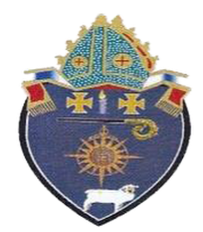
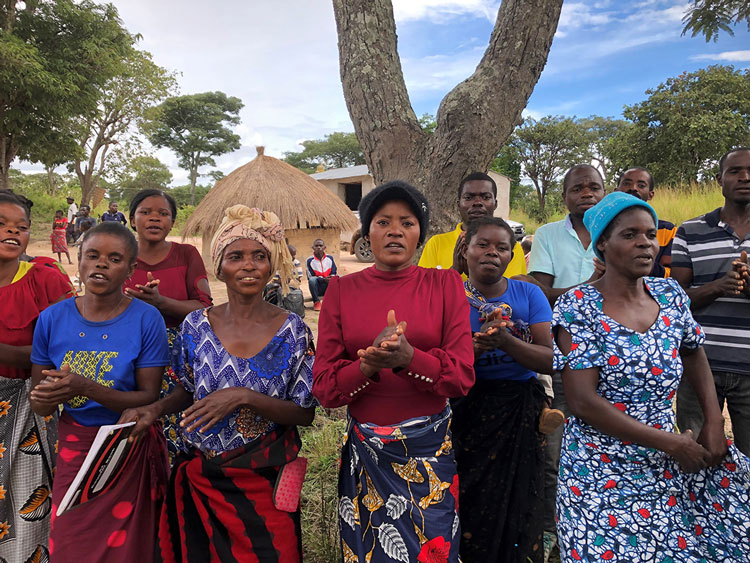
Women welcome visitors to village Koama Makasa March 2023. © Julianne Stewart, AID.
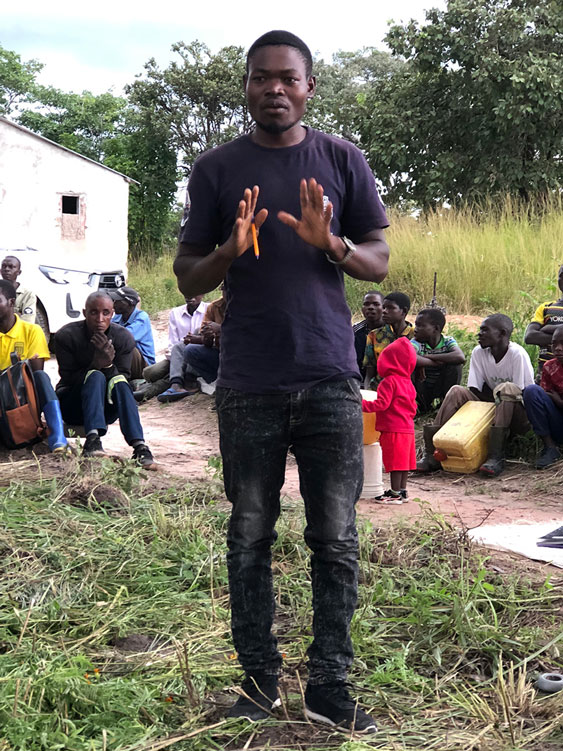
Robbie is a Gender Action Group Lead Promoter. © Julianne Stewart, AID.
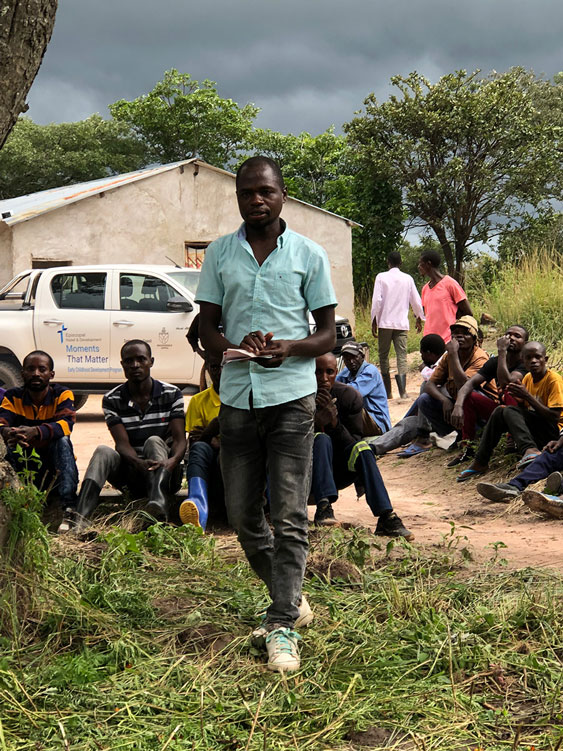
Christopher has joined the Men Engage Network to advocate with men against GBV. © Julianne Stewart, AID.
